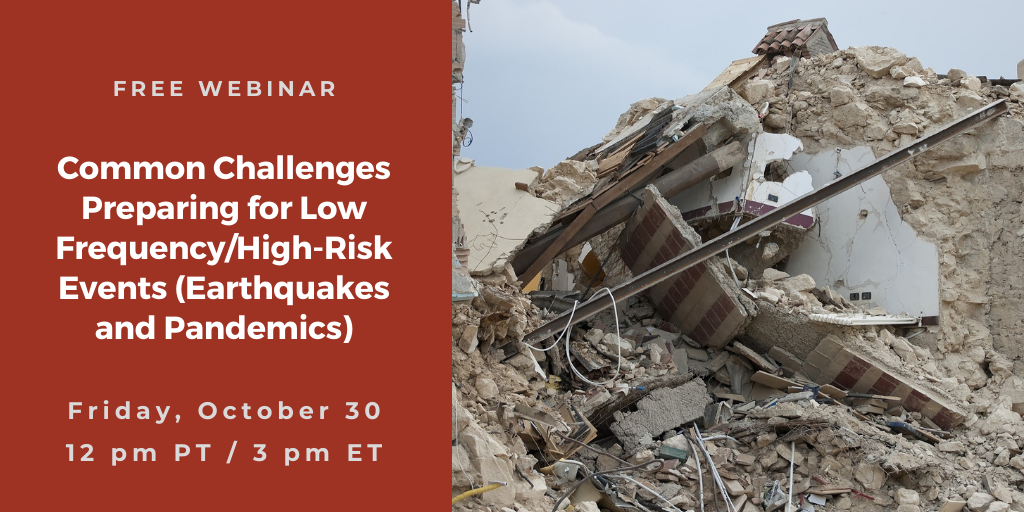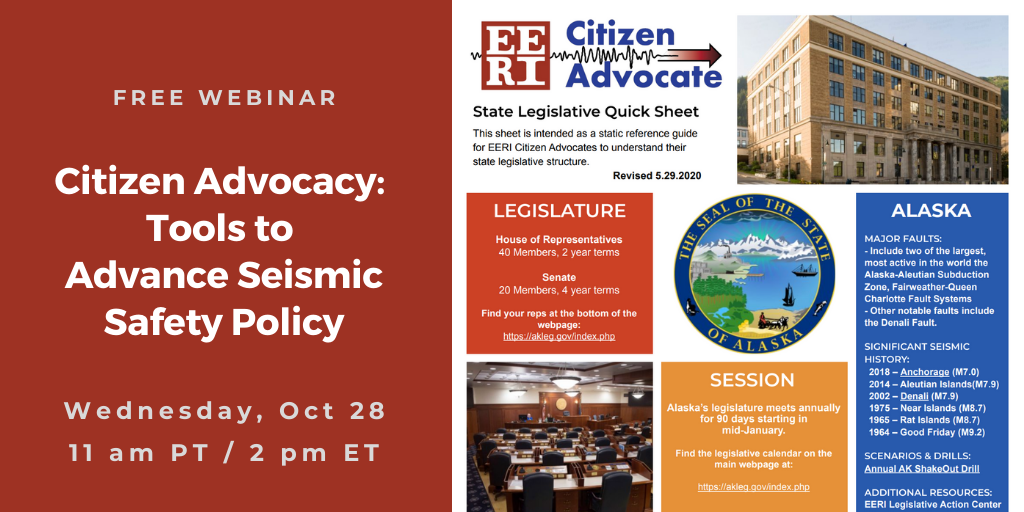
Join us for a special three-part webinar series, “Applying Lessons Learned from COVID-19 to Earthquake Preparedness,” presented by the EERI San Diego Regional Chapter.
Global pandemics and large earthquakes don’t occur often, yet they can produce enormous human and economic losses. Current experiences with the COVID-19 pandemic can be useful for discussing and preparing for these “low frequency/high risk” events. Although our scientific knowledge and technology are better now than they have ever been, COVID-19 has posed tremendous challenges for the world in the past six months despite attempts to prepare for events such as this. This webinar series will explore lessons from the pandemic that can help us prepare for earthquakes.
EERI’s webinar series is made possible with support from FEMA under cooperative agreement EMW-2020-CA-00029-S01. The series is also sponsored by RMA Companies.

First webinar: Using Scenarios for Preparedness: Comparing Pandemics and Earthquakes
Friday, October 16, 12 pm PT / 3 pm ET.
Scenarios are useful planning tools to help us prepare for future events, particularly events that have a low frequency of occurrence, but a high risk of losses, such as large earthquakes and global pandemics. Several public health scenarios were developed in recent years to better understand and prepare for a global pandemic, prior to the COVID-19 pandemic. This webinar discusses the outcomes and conclusions of these scenarios, comparing our current experiences with COVID-19 and existing earthquake scenarios to improve earthquake preparedness in our community.
Second Webinar: Common Challenges Preparing for Low Frequency/High-Risk Events (Earthquakes and Pandemics)
Friday, October 30, 12 pm PT / 3 pm ET
Preparing and planning for events that have a low frequency of occurrence, but a high-risk of loss associated with them can have a number of obstacles. These obstacles include changing public perception of risk, communicating information to a non-scientific population, obtaining sustained political and financial support, amongst many others. Panelists will discuss these challenges in the context of our current experiences with COVID-19. The webinar will also discuss how learning from the failures and successes of our experiences with COVID-19 will help counter similar challenges in planning for earthquakes and developing more seismically resilient communities.
Third Webinar: Next Steps for Earthquake Preparedness in the San Diego Community
Friday, November 13, 12 pm PT / 3 pm ET |
Developing communities that are more earthquake-resilient and better prepared for large disasters takes time, resources, and lots of planning. This webinar will focus on how to prepare in our community, looking at outreach, developing a group of stakeholders, and identifying short-term and long-term goals for San Diego. This webinar is intended to be more interactive, with discussion amongst stakeholders. The basis for this discussion will be the San Diego Earthquake Scenario released in March, 2020 before the pandemics hit the San Diego region.


 Jack English is a graduate student at the University of Texas at Austin, earning a dual degree M.S. in Civil Engineering and Master of Public Affairs. He obtained a dual B.S./B.A. degree in Civil Engineering and Political Science from Case Western Reserve University in 2018. He has worked for members of the U.S. House of Representatives, the U.S. Senate, and the California Assembly. He currently serves on the EERI Public Policy & Advocacy Committee, its California Subcommittee, and as the PPA liaison to the YMC. A native of San Francisco, Jack seeks to improve resilience implementation across levels of government by bridging the gap between policy development and engineering.
Jack English is a graduate student at the University of Texas at Austin, earning a dual degree M.S. in Civil Engineering and Master of Public Affairs. He obtained a dual B.S./B.A. degree in Civil Engineering and Political Science from Case Western Reserve University in 2018. He has worked for members of the U.S. House of Representatives, the U.S. Senate, and the California Assembly. He currently serves on the EERI Public Policy & Advocacy Committee, its California Subcommittee, and as the PPA liaison to the YMC. A native of San Francisco, Jack seeks to improve resilience implementation across levels of government by bridging the gap between policy development and engineering. Zahraa Saiyed is a disaster risk reduction and public policy consultant with background and training as an architect, building scientist, structural engineer, and educator based in California. Zahraa’s domestic and international work ranges from anticipatory design projects, designing sustainable and resilient built environments, developing practice and personal preparedness guidance, and policy evaluation and development for seismic risk reduction at the federal, state, and local level. She leads EERI’s Public Policy and Advocacy Committee, is a member of the Western States Seismic Policy Council’s (WSSPC) Building Engineering, Construction and Building Codes Committee, and is a member of the Infrastructure Policy committee with the American Society of Civil Engineers (ASCE). Zahraa’s legislative advocacy has ranged from seismic safety and preparedness, to equity in the workplace, as well as medical consumer rights for public health and wellness. She is a co-founder and principal of Scyma Consulting LLC located in the Bay Area, and is an adjunct professor of Architecture and Community Design at the University of San Francisco.
Zahraa Saiyed is a disaster risk reduction and public policy consultant with background and training as an architect, building scientist, structural engineer, and educator based in California. Zahraa’s domestic and international work ranges from anticipatory design projects, designing sustainable and resilient built environments, developing practice and personal preparedness guidance, and policy evaluation and development for seismic risk reduction at the federal, state, and local level. She leads EERI’s Public Policy and Advocacy Committee, is a member of the Western States Seismic Policy Council’s (WSSPC) Building Engineering, Construction and Building Codes Committee, and is a member of the Infrastructure Policy committee with the American Society of Civil Engineers (ASCE). Zahraa’s legislative advocacy has ranged from seismic safety and preparedness, to equity in the workplace, as well as medical consumer rights for public health and wellness. She is a co-founder and principal of Scyma Consulting LLC located in the Bay Area, and is an adjunct professor of Architecture and Community Design at the University of San Francisco.

















